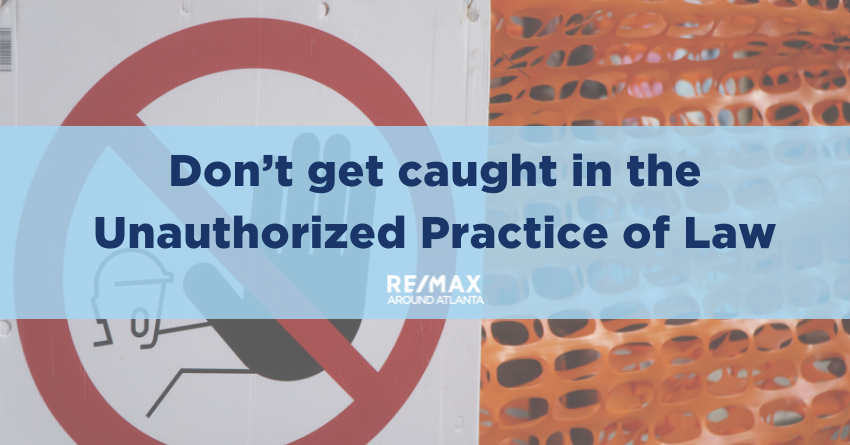|
Georgia Law governs the unauthorized practice of law (O.C.G.A. 15-19-51 (2010)). Realtors® can unknowingly fall into the unauthorized practice of law just by changing the GAR forms. Even minor modifications to the GAR forms may constitute the unauthorized practice of law. Article 13 of the REALTORS® Code of Ethics also prohibits the unauthorized practice of law and specifically requires NAR members to recommend using legal counsel when the interests of any party to the transaction require it. REALTORS® should be aware of this ethical obligation when navigating their way through this issue.
Don’t Draft, Edit, or Interpret First, never create your own legal agreements for clients. Instead, use the GAR forms provided to you. Second, even when using a form agreement, do not edit the printed document in a substantive way. Limit your editing to filling in factual provisions of the agreement, such as names, dates, addresses, time periods, terms, and special stipulations. If there are edits to the GAR printed form, it is no longer a GAR form. It is then your personal form. You cannot use the GAR logo and you are subject to a charge of unauthorized practice of law. Should a transaction require edits beyond just filling in factual information, contact the Broker Team, contact the RMAA In-House Counsel or refer clients to a real estate attorney. This is not only your ethical obligation as a REALTOR®, but can keep you out of a possible lawsuit and GREC violations. Third, don’t charge a fee for preparing any of the legal agreements or forms. Numerous states have found that preparing legal documents constitutes the unauthorized practice of law. And finally, don’t try to interpret legal contract language. The policy reasons behind the unauthorized practice of law are clear. Prior to providing legal advice, individuals must meet a number of requirements, including graduating from law school, passing the state bar exam, and obtaining a license to practice law. These requirements ensure that only people with sufficient knowledge and skills may represent the public in legal matters. As transactions become more complex, it’s not uncommon for clients to ask real estate practitioners to interpret a contract. Resist the temptation. The best answer, and the ethical obligation under the Code of Ethics, is to direct clients to an attorney. There’s a lot at stake: The unauthorized practice of law can result in civil actions, as well as GREC fines, suspension, and even revocation of your license. Help your clients by recommending they consult an attorney in appropriate circumstances. By following these tips, you’re not only helping protect yourself against potential legal and ethical trouble but also best serving your clients by encouraging them to get the assistance of a legal expert for the advice they need to complete a successful transaction.
0 Comments
Leave a Reply. |
RMAAReal Estate News, Brokers Blog & More Categories
All
Archives
July 2024
|


 RSS Feed
RSS Feed